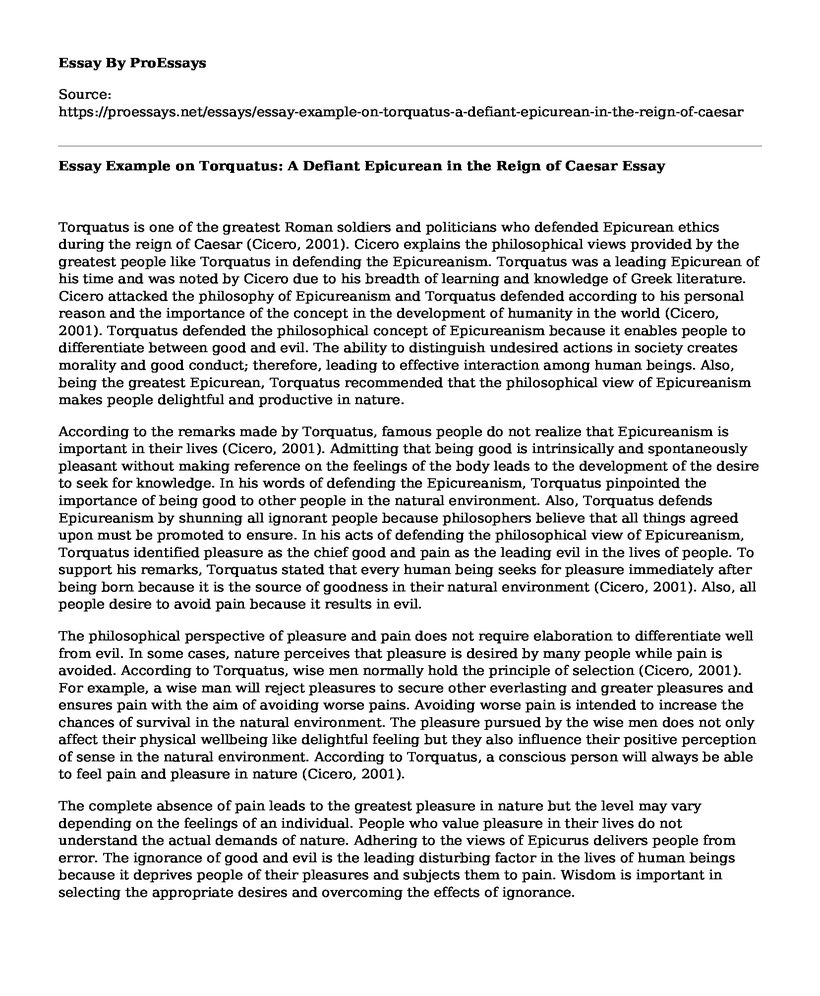Torquatus is one of the greatest Roman soldiers and politicians who defended Epicurean ethics during the reign of Caesar (Cicero, 2001). Cicero explains the philosophical views provided by the greatest people like Torquatus in defending the Epicureanism. Torquatus was a leading Epicurean of his time and was noted by Cicero due to his breadth of learning and knowledge of Greek literature. Cicero attacked the philosophy of Epicureanism and Torquatus defended according to his personal reason and the importance of the concept in the development of humanity in the world (Cicero, 2001). Torquatus defended the philosophical concept of Epicureanism because it enables people to differentiate between good and evil. The ability to distinguish undesired actions in society creates morality and good conduct; therefore, leading to effective interaction among human beings. Also, being the greatest Epicurean, Torquatus recommended that the philosophical view of Epicureanism makes people delightful and productive in nature.
According to the remarks made by Torquatus, famous people do not realize that Epicureanism is important in their lives (Cicero, 2001). Admitting that being good is intrinsically and spontaneously pleasant without making reference on the feelings of the body leads to the development of the desire to seek for knowledge. In his words of defending the Epicureanism, Torquatus pinpointed the importance of being good to other people in the natural environment. Also, Torquatus defends Epicureanism by shunning all ignorant people because philosophers believe that all things agreed upon must be promoted to ensure. In his acts of defending the philosophical view of Epicureanism, Torquatus identified pleasure as the chief good and pain as the leading evil in the lives of people. To support his remarks, Torquatus stated that every human being seeks for pleasure immediately after being born because it is the source of goodness in their natural environment (Cicero, 2001). Also, all people desire to avoid pain because it results in evil.
The philosophical perspective of pleasure and pain does not require elaboration to differentiate well from evil. In some cases, nature perceives that pleasure is desired by many people while pain is avoided. According to Torquatus, wise men normally hold the principle of selection (Cicero, 2001). For example, a wise man will reject pleasures to secure other everlasting and greater pleasures and ensures pain with the aim of avoiding worse pains. Avoiding worse pain is intended to increase the chances of survival in the natural environment. The pleasure pursued by the wise men does not only affect their physical wellbeing like delightful feeling but they also influence their positive perception of sense in the natural environment. According to Torquatus, a conscious person will always be able to feel pain and pleasure in nature (Cicero, 2001).
The complete absence of pain leads to the greatest pleasure in nature but the level may vary depending on the feelings of an individual. People who value pleasure in their lives do not understand the actual demands of nature. Adhering to the views of Epicurus delivers people from error. The ignorance of good and evil is the leading disturbing factor in the lives of human beings because it deprives people of their pleasures and subjects them to pain. Wisdom is important in selecting the appropriate desires and overcoming the effects of ignorance.
Conclusion
To conclude, wisdom is an important virtue the selecting the appropriate desires based on the abilities of a person to differentiate well from evil. Courage is another essential quality that enables people to select appropriate action that leads to pleasures and avoidance of pain as the chief evil in nature.
Reference
Cicero, M. T. (2001). Cicero: On Moral Ends. Cambridge University Press. Retrieved from: https://books.google.co.ke/books?hl=en&lr=&id=LOhj6snx4T8C&oi=fnd&pg=PR7&dq=Torquatus+Defends+Epicureanism+by+Cicero&ots=zIxdLeqO-s&sig=82d2Kb--rW8jAmZJFCt4uvpFVrQ&redir_esc=y#v=onepage&q=Torquatus%20Defends%20Epicureanism%20by%20Cicero&f=false
Cite this page
Essay Example on Torquatus: A Defiant Epicurean in the Reign of Caesar. (2023, Feb 09). Retrieved from https://proessays.net/essays/essay-example-on-torquatus-a-defiant-epicurean-in-the-reign-of-caesar
If you are the original author of this essay and no longer wish to have it published on the ProEssays website, please click below to request its removal:
- Reflection Paper: The Plague of Athens
- Essay Sample on Violation of Human Rights
- Essay Sample on 19th-Century Americans: Worries Over Volatility, Slavery, and Legacy
- Essay Example on WWI: Origins Explained - Imperialism, Power & Conflict
- 78 Years Later: Gentrix Badoux's Story of the Pearl Harbour Attack - Research Paper
- Paper Sample on Racism in US: A Legacy of Colonialism & Inequality
- Paper Example on Exploring the Roots: Native Americans, Colonies, and the Formation of the United States







